Social Media Impact on Nurses: Opportunities, Risks, and Guidelines
VerifiedAdded on 2022/12/16
|7
|2626
|420
Essay
AI Summary
This essay examines the multifaceted impact of social media on the nursing profession. It begins by defining social media and then identifies two key opportunities, such as professional networking and improved healthcare education, highlighting how nurses can leverage these platforms for enhanced practice and knowledge sharing. The essay also acknowledges potential risks, particularly the violation of patient confidentiality and boundary violations, emphasizing the importance of ethical conduct and adherence to professional standards. Recommendations are provided for nurses to maintain professionalism online, referencing legal, ethical, and professional codes of practice, including guidelines on patient privacy, online communication, and maintaining professional boundaries. The discussion is supported by scholarly literature, legislation, and professional codes of practice, offering a comprehensive overview of responsible social media use in nursing and promoting safe and ethical online behavior.
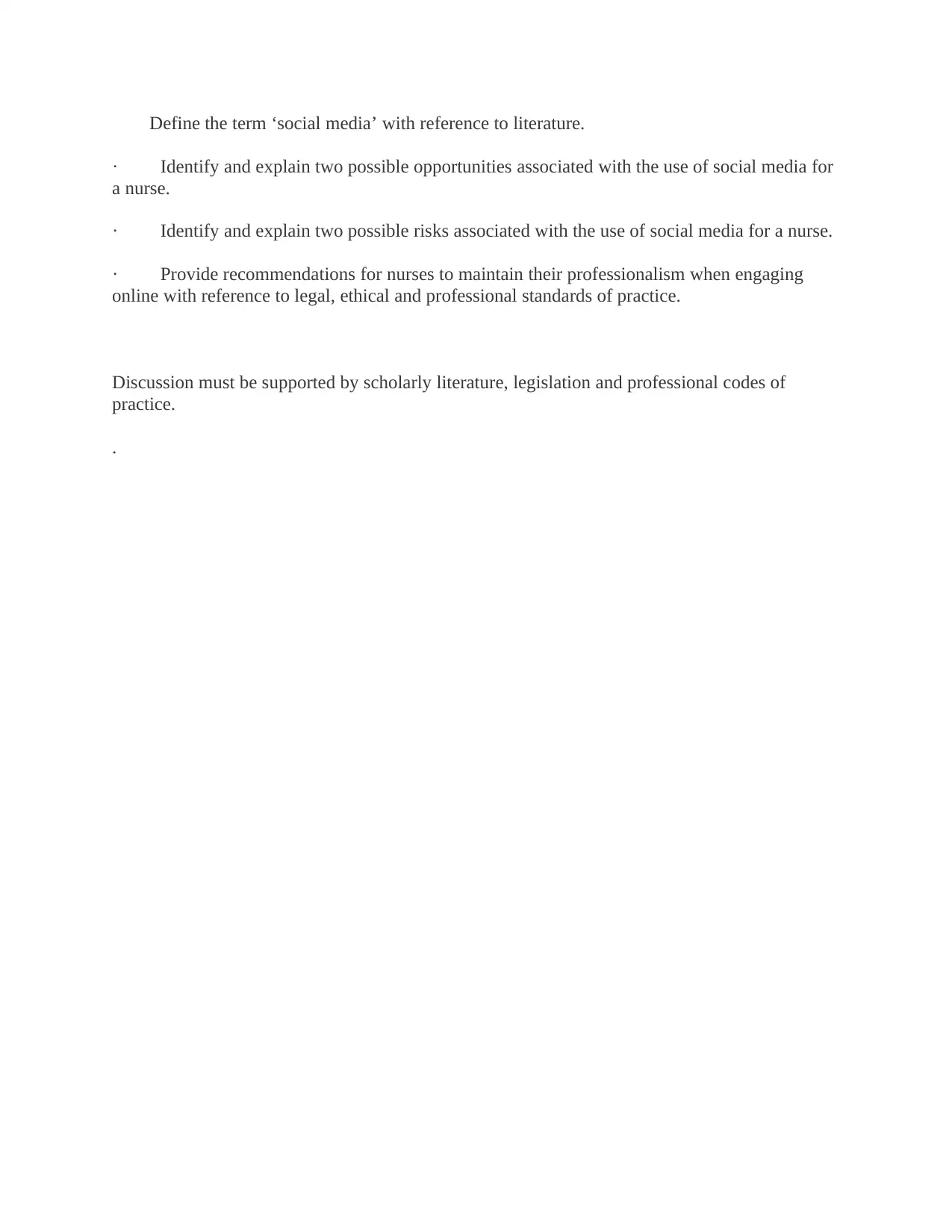
Define the term ‘social media’ with reference to literature.
· Identify and explain two possible opportunities associated with the use of social media for
a nurse.
· Identify and explain two possible risks associated with the use of social media for a nurse.
· Provide recommendations for nurses to maintain their professionalism when engaging
online with reference to legal, ethical and professional standards of practice.
Discussion must be supported by scholarly literature, legislation and professional codes of
practice.
.
· Identify and explain two possible opportunities associated with the use of social media for
a nurse.
· Identify and explain two possible risks associated with the use of social media for a nurse.
· Provide recommendations for nurses to maintain their professionalism when engaging
online with reference to legal, ethical and professional standards of practice.
Discussion must be supported by scholarly literature, legislation and professional codes of
practice.
.
Paraphrase This Document
Need a fresh take? Get an instant paraphrase of this document with our AI Paraphraser
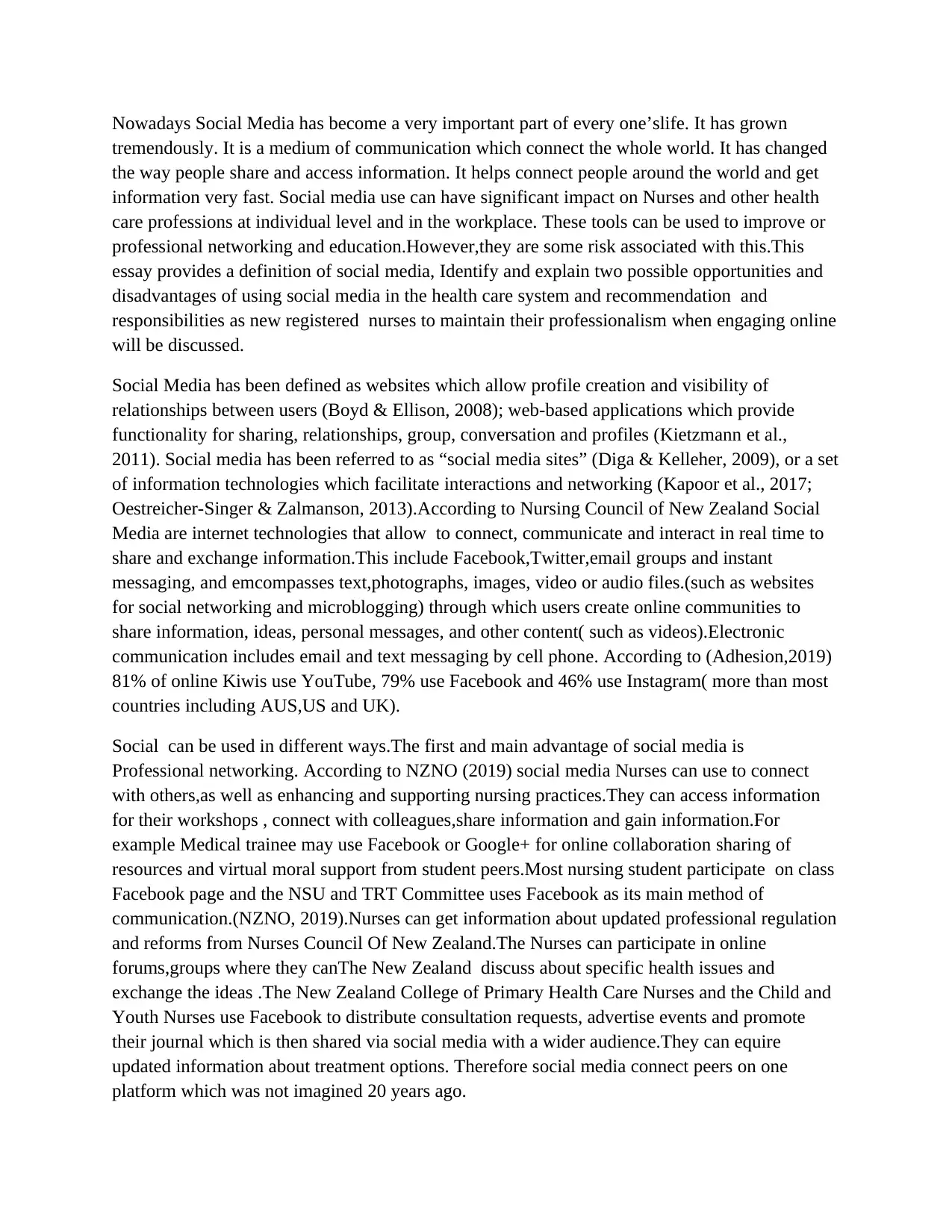
Nowadays Social Media has become a very important part of every one’slife. It has grown
tremendously. It is a medium of communication which connect the whole world. It has changed
the way people share and access information. It helps connect people around the world and get
information very fast. Social media use can have significant impact on Nurses and other health
care professions at individual level and in the workplace. These tools can be used to improve or
professional networking and education.However,they are some risk associated with this.This
essay provides a definition of social media, Identify and explain two possible opportunities and
disadvantages of using social media in the health care system and recommendation and
responsibilities as new registered nurses to maintain their professionalism when engaging online
will be discussed.
Social Media has been defined as websites which allow profile creation and visibility of
relationships between users (Boyd & Ellison, 2008); web-based applications which provide
functionality for sharing, relationships, group, conversation and profiles (Kietzmann et al.,
2011). Social media has been referred to as “social media sites” (Diga & Kelleher, 2009), or a set
of information technologies which facilitate interactions and networking (Kapoor et al., 2017;
Oestreicher-Singer & Zalmanson, 2013).According to Nursing Council of New Zealand Social
Media are internet technologies that allow to connect, communicate and interact in real time to
share and exchange information.This include Facebook,Twitter,email groups and instant
messaging, and emcompasses text,photographs, images, video or audio files.(such as websites
for social networking and microblogging) through which users create online communities to
share information, ideas, personal messages, and other content( such as videos).Electronic
communication includes email and text messaging by cell phone. According to (Adhesion,2019)
81% of online Kiwis use YouTube, 79% use Facebook and 46% use Instagram( more than most
countries including AUS,US and UK).
Social can be used in different ways.The first and main advantage of social media is
Professional networking. According to NZNO (2019) social media Nurses can use to connect
with others,as well as enhancing and supporting nursing practices.They can access information
for their workshops , connect with colleagues,share information and gain information.For
example Medical trainee may use Facebook or Google+ for online collaboration sharing of
resources and virtual moral support from student peers.Most nursing student participate on class
Facebook page and the NSU and TRT Committee uses Facebook as its main method of
communication.(NZNO, 2019).Nurses can get information about updated professional regulation
and reforms from Nurses Council Of New Zealand.The Nurses can participate in online
forums,groups where they canThe New Zealand discuss about specific health issues and
exchange the ideas .The New Zealand College of Primary Health Care Nurses and the Child and
Youth Nurses use Facebook to distribute consultation requests, advertise events and promote
their journal which is then shared via social media with a wider audience.They can equire
updated information about treatment options. Therefore social media connect peers on one
platform which was not imagined 20 years ago.
tremendously. It is a medium of communication which connect the whole world. It has changed
the way people share and access information. It helps connect people around the world and get
information very fast. Social media use can have significant impact on Nurses and other health
care professions at individual level and in the workplace. These tools can be used to improve or
professional networking and education.However,they are some risk associated with this.This
essay provides a definition of social media, Identify and explain two possible opportunities and
disadvantages of using social media in the health care system and recommendation and
responsibilities as new registered nurses to maintain their professionalism when engaging online
will be discussed.
Social Media has been defined as websites which allow profile creation and visibility of
relationships between users (Boyd & Ellison, 2008); web-based applications which provide
functionality for sharing, relationships, group, conversation and profiles (Kietzmann et al.,
2011). Social media has been referred to as “social media sites” (Diga & Kelleher, 2009), or a set
of information technologies which facilitate interactions and networking (Kapoor et al., 2017;
Oestreicher-Singer & Zalmanson, 2013).According to Nursing Council of New Zealand Social
Media are internet technologies that allow to connect, communicate and interact in real time to
share and exchange information.This include Facebook,Twitter,email groups and instant
messaging, and emcompasses text,photographs, images, video or audio files.(such as websites
for social networking and microblogging) through which users create online communities to
share information, ideas, personal messages, and other content( such as videos).Electronic
communication includes email and text messaging by cell phone. According to (Adhesion,2019)
81% of online Kiwis use YouTube, 79% use Facebook and 46% use Instagram( more than most
countries including AUS,US and UK).
Social can be used in different ways.The first and main advantage of social media is
Professional networking. According to NZNO (2019) social media Nurses can use to connect
with others,as well as enhancing and supporting nursing practices.They can access information
for their workshops , connect with colleagues,share information and gain information.For
example Medical trainee may use Facebook or Google+ for online collaboration sharing of
resources and virtual moral support from student peers.Most nursing student participate on class
Facebook page and the NSU and TRT Committee uses Facebook as its main method of
communication.(NZNO, 2019).Nurses can get information about updated professional regulation
and reforms from Nurses Council Of New Zealand.The Nurses can participate in online
forums,groups where they canThe New Zealand discuss about specific health issues and
exchange the ideas .The New Zealand College of Primary Health Care Nurses and the Child and
Youth Nurses use Facebook to distribute consultation requests, advertise events and promote
their journal which is then shared via social media with a wider audience.They can equire
updated information about treatment options. Therefore social media connect peers on one
platform which was not imagined 20 years ago.
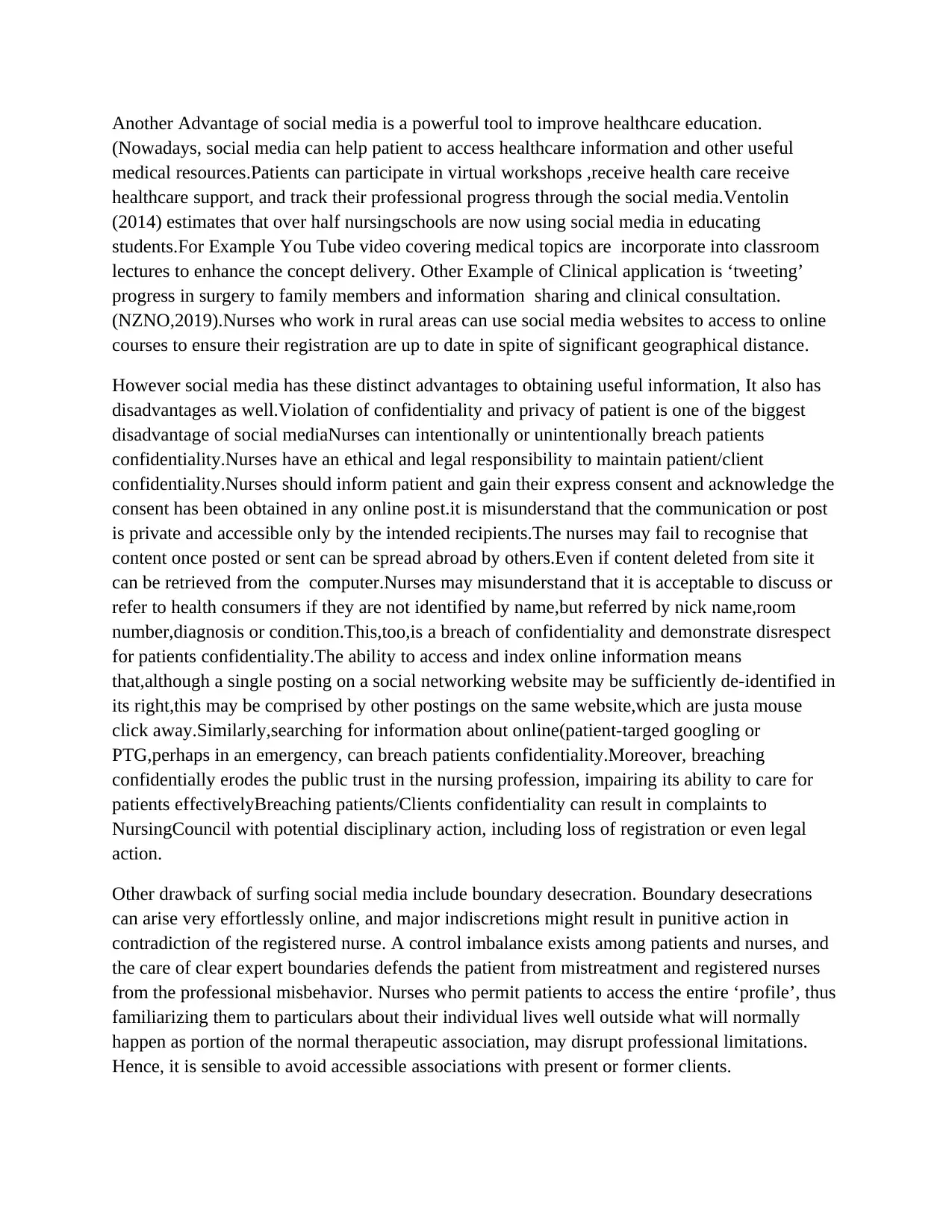
Another Advantage of social media is a powerful tool to improve healthcare education.
(Nowadays, social media can help patient to access healthcare information and other useful
medical resources.Patients can participate in virtual workshops ,receive health care receive
healthcare support, and track their professional progress through the social media.Ventolin
(2014) estimates that over half nursingschools are now using social media in educating
students.For Example You Tube video covering medical topics are incorporate into classroom
lectures to enhance the concept delivery. Other Example of Clinical application is ‘tweeting’
progress in surgery to family members and information sharing and clinical consultation.
(NZNO,2019).Nurses who work in rural areas can use social media websites to access to online
courses to ensure their registration are up to date in spite of significant geographical distance.
However social media has these distinct advantages to obtaining useful information, It also has
disadvantages as well.Violation of confidentiality and privacy of patient is one of the biggest
disadvantage of social mediaNurses can intentionally or unintentionally breach patients
confidentiality.Nurses have an ethical and legal responsibility to maintain patient/client
confidentiality.Nurses should inform patient and gain their express consent and acknowledge the
consent has been obtained in any online post.it is misunderstand that the communication or post
is private and accessible only by the intended recipients.The nurses may fail to recognise that
content once posted or sent can be spread abroad by others.Even if content deleted from site it
can be retrieved from the computer.Nurses may misunderstand that it is acceptable to discuss or
refer to health consumers if they are not identified by name,but referred by nick name,room
number,diagnosis or condition.This,too,is a breach of confidentiality and demonstrate disrespect
for patients confidentiality.The ability to access and index online information means
that,although a single posting on a social networking website may be sufficiently de-identified in
its right,this may be comprised by other postings on the same website,which are justa mouse
click away.Similarly,searching for information about online(patient-targed googling or
PTG,perhaps in an emergency, can breach patients confidentiality.Moreover, breaching
confidentially erodes the public trust in the nursing profession, impairing its ability to care for
patients effectivelyBreaching patients/Clients confidentiality can result in complaints to
NursingCouncil with potential disciplinary action, including loss of registration or even legal
action.
Other drawback of surfing social media include boundary desecration. Boundary desecrations
can arise very effortlessly online, and major indiscretions might result in punitive action in
contradiction of the registered nurse. A control imbalance exists among patients and nurses, and
the care of clear expert boundaries defends the patient from mistreatment and registered nurses
from the professional misbehavior. Nurses who permit patients to access the entire ‘profile’, thus
familiarizing them to particulars about their individual lives well outside what will normally
happen as portion of the normal therapeutic association, may disrupt professional limitations.
Hence, it is sensible to avoid accessible associations with present or former clients.
(Nowadays, social media can help patient to access healthcare information and other useful
medical resources.Patients can participate in virtual workshops ,receive health care receive
healthcare support, and track their professional progress through the social media.Ventolin
(2014) estimates that over half nursingschools are now using social media in educating
students.For Example You Tube video covering medical topics are incorporate into classroom
lectures to enhance the concept delivery. Other Example of Clinical application is ‘tweeting’
progress in surgery to family members and information sharing and clinical consultation.
(NZNO,2019).Nurses who work in rural areas can use social media websites to access to online
courses to ensure their registration are up to date in spite of significant geographical distance.
However social media has these distinct advantages to obtaining useful information, It also has
disadvantages as well.Violation of confidentiality and privacy of patient is one of the biggest
disadvantage of social mediaNurses can intentionally or unintentionally breach patients
confidentiality.Nurses have an ethical and legal responsibility to maintain patient/client
confidentiality.Nurses should inform patient and gain their express consent and acknowledge the
consent has been obtained in any online post.it is misunderstand that the communication or post
is private and accessible only by the intended recipients.The nurses may fail to recognise that
content once posted or sent can be spread abroad by others.Even if content deleted from site it
can be retrieved from the computer.Nurses may misunderstand that it is acceptable to discuss or
refer to health consumers if they are not identified by name,but referred by nick name,room
number,diagnosis or condition.This,too,is a breach of confidentiality and demonstrate disrespect
for patients confidentiality.The ability to access and index online information means
that,although a single posting on a social networking website may be sufficiently de-identified in
its right,this may be comprised by other postings on the same website,which are justa mouse
click away.Similarly,searching for information about online(patient-targed googling or
PTG,perhaps in an emergency, can breach patients confidentiality.Moreover, breaching
confidentially erodes the public trust in the nursing profession, impairing its ability to care for
patients effectivelyBreaching patients/Clients confidentiality can result in complaints to
NursingCouncil with potential disciplinary action, including loss of registration or even legal
action.
Other drawback of surfing social media include boundary desecration. Boundary desecrations
can arise very effortlessly online, and major indiscretions might result in punitive action in
contradiction of the registered nurse. A control imbalance exists among patients and nurses, and
the care of clear expert boundaries defends the patient from mistreatment and registered nurses
from the professional misbehavior. Nurses who permit patients to access the entire ‘profile’, thus
familiarizing them to particulars about their individual lives well outside what will normally
happen as portion of the normal therapeutic association, may disrupt professional limitations.
Hence, it is sensible to avoid accessible associations with present or former clients.
⊘ This is a preview!⊘
Do you want full access?
Subscribe today to unlock all pages.

Trusted by 1+ million students worldwide
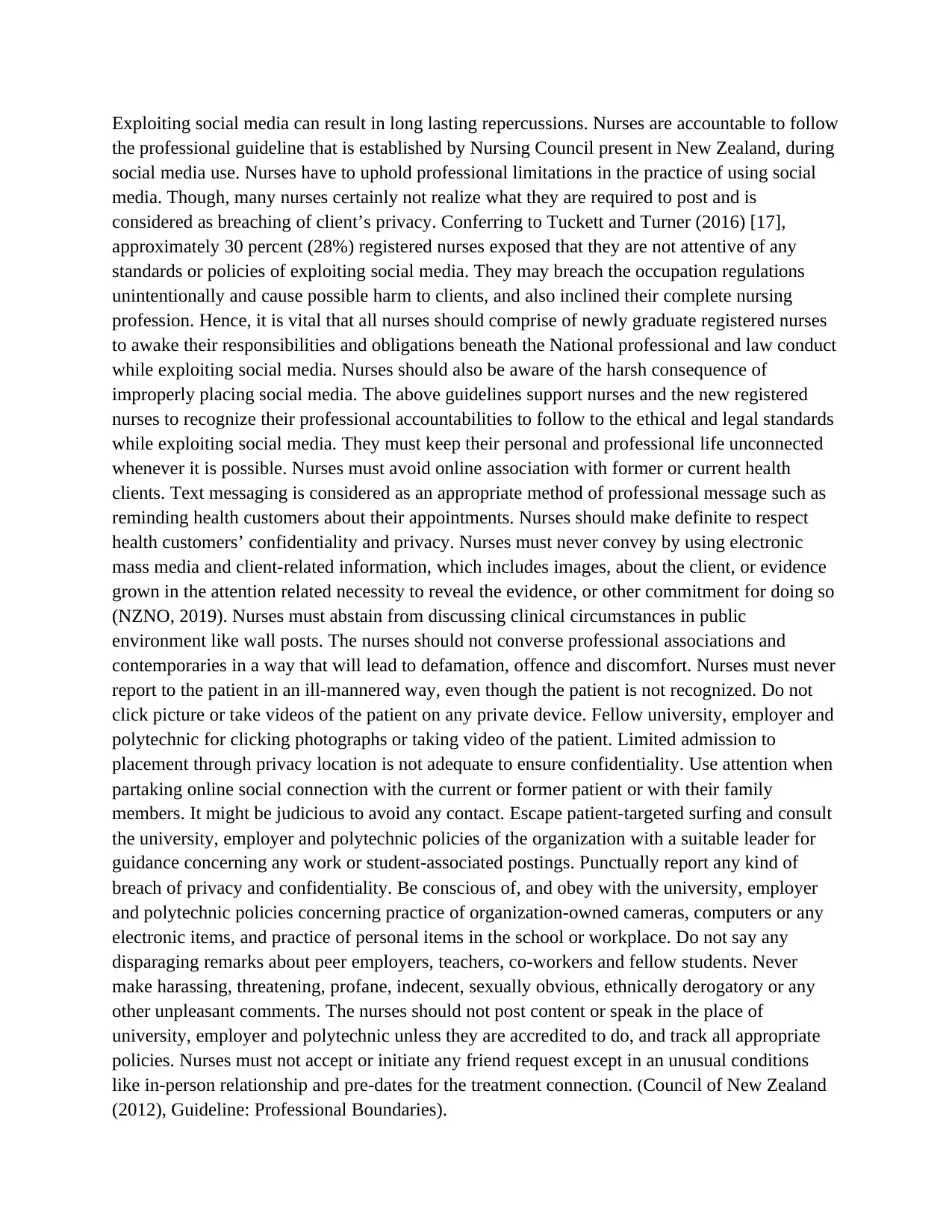
Exploiting social media can result in long lasting repercussions. Nurses are accountable to follow
the professional guideline that is established by Nursing Council present in New Zealand, during
social media use. Nurses have to uphold professional limitations in the practice of using social
media. Though, many nurses certainly not realize what they are required to post and is
considered as breaching of client’s privacy. Conferring to Tuckett and Turner (2016) [17],
approximately 30 percent (28%) registered nurses exposed that they are not attentive of any
standards or policies of exploiting social media. They may breach the occupation regulations
unintentionally and cause possible harm to clients, and also inclined their complete nursing
profession. Hence, it is vital that all nurses should comprise of newly graduate registered nurses
to awake their responsibilities and obligations beneath the National professional and law conduct
while exploiting social media. Nurses should also be aware of the harsh consequence of
improperly placing social media. The above guidelines support nurses and the new registered
nurses to recognize their professional accountabilities to follow to the ethical and legal standards
while exploiting social media. They must keep their personal and professional life unconnected
whenever it is possible. Nurses must avoid online association with former or current health
clients. Text messaging is considered as an appropriate method of professional message such as
reminding health customers about their appointments. Nurses should make definite to respect
health customers’ confidentiality and privacy. Nurses must never convey by using electronic
mass media and client-related information, which includes images, about the client, or evidence
grown in the attention related necessity to reveal the evidence, or other commitment for doing so
(NZNO, 2019). Nurses must abstain from discussing clinical circumstances in public
environment like wall posts. The nurses should not converse professional associations and
contemporaries in a way that will lead to defamation, offence and discomfort. Nurses must never
report to the patient in an ill-mannered way, even though the patient is not recognized. Do not
click picture or take videos of the patient on any private device. Fellow university, employer and
polytechnic for clicking photographs or taking video of the patient. Limited admission to
placement through privacy location is not adequate to ensure confidentiality. Use attention when
partaking online social connection with the current or former patient or with their family
members. It might be judicious to avoid any contact. Escape patient-targeted surfing and consult
the university, employer and polytechnic policies of the organization with a suitable leader for
guidance concerning any work or student-associated postings. Punctually report any kind of
breach of privacy and confidentiality. Be conscious of, and obey with the university, employer
and polytechnic policies concerning practice of organization-owned cameras, computers or any
electronic items, and practice of personal items in the school or workplace. Do not say any
disparaging remarks about peer employers, teachers, co-workers and fellow students. Never
make harassing, threatening, profane, indecent, sexually obvious, ethnically derogatory or any
other unpleasant comments. The nurses should not post content or speak in the place of
university, employer and polytechnic unless they are accredited to do, and track all appropriate
policies. Nurses must not accept or initiate any friend request except in an unusual conditions
like in-person relationship and pre-dates for the treatment connection. (Council of New Zealand
(2012), Guideline: Professional Boundaries).
the professional guideline that is established by Nursing Council present in New Zealand, during
social media use. Nurses have to uphold professional limitations in the practice of using social
media. Though, many nurses certainly not realize what they are required to post and is
considered as breaching of client’s privacy. Conferring to Tuckett and Turner (2016) [17],
approximately 30 percent (28%) registered nurses exposed that they are not attentive of any
standards or policies of exploiting social media. They may breach the occupation regulations
unintentionally and cause possible harm to clients, and also inclined their complete nursing
profession. Hence, it is vital that all nurses should comprise of newly graduate registered nurses
to awake their responsibilities and obligations beneath the National professional and law conduct
while exploiting social media. Nurses should also be aware of the harsh consequence of
improperly placing social media. The above guidelines support nurses and the new registered
nurses to recognize their professional accountabilities to follow to the ethical and legal standards
while exploiting social media. They must keep their personal and professional life unconnected
whenever it is possible. Nurses must avoid online association with former or current health
clients. Text messaging is considered as an appropriate method of professional message such as
reminding health customers about their appointments. Nurses should make definite to respect
health customers’ confidentiality and privacy. Nurses must never convey by using electronic
mass media and client-related information, which includes images, about the client, or evidence
grown in the attention related necessity to reveal the evidence, or other commitment for doing so
(NZNO, 2019). Nurses must abstain from discussing clinical circumstances in public
environment like wall posts. The nurses should not converse professional associations and
contemporaries in a way that will lead to defamation, offence and discomfort. Nurses must never
report to the patient in an ill-mannered way, even though the patient is not recognized. Do not
click picture or take videos of the patient on any private device. Fellow university, employer and
polytechnic for clicking photographs or taking video of the patient. Limited admission to
placement through privacy location is not adequate to ensure confidentiality. Use attention when
partaking online social connection with the current or former patient or with their family
members. It might be judicious to avoid any contact. Escape patient-targeted surfing and consult
the university, employer and polytechnic policies of the organization with a suitable leader for
guidance concerning any work or student-associated postings. Punctually report any kind of
breach of privacy and confidentiality. Be conscious of, and obey with the university, employer
and polytechnic policies concerning practice of organization-owned cameras, computers or any
electronic items, and practice of personal items in the school or workplace. Do not say any
disparaging remarks about peer employers, teachers, co-workers and fellow students. Never
make harassing, threatening, profane, indecent, sexually obvious, ethnically derogatory or any
other unpleasant comments. The nurses should not post content or speak in the place of
university, employer and polytechnic unless they are accredited to do, and track all appropriate
policies. Nurses must not accept or initiate any friend request except in an unusual conditions
like in-person relationship and pre-dates for the treatment connection. (Council of New Zealand
(2012), Guideline: Professional Boundaries).
Paraphrase This Document
Need a fresh take? Get an instant paraphrase of this document with our AI Paraphraser
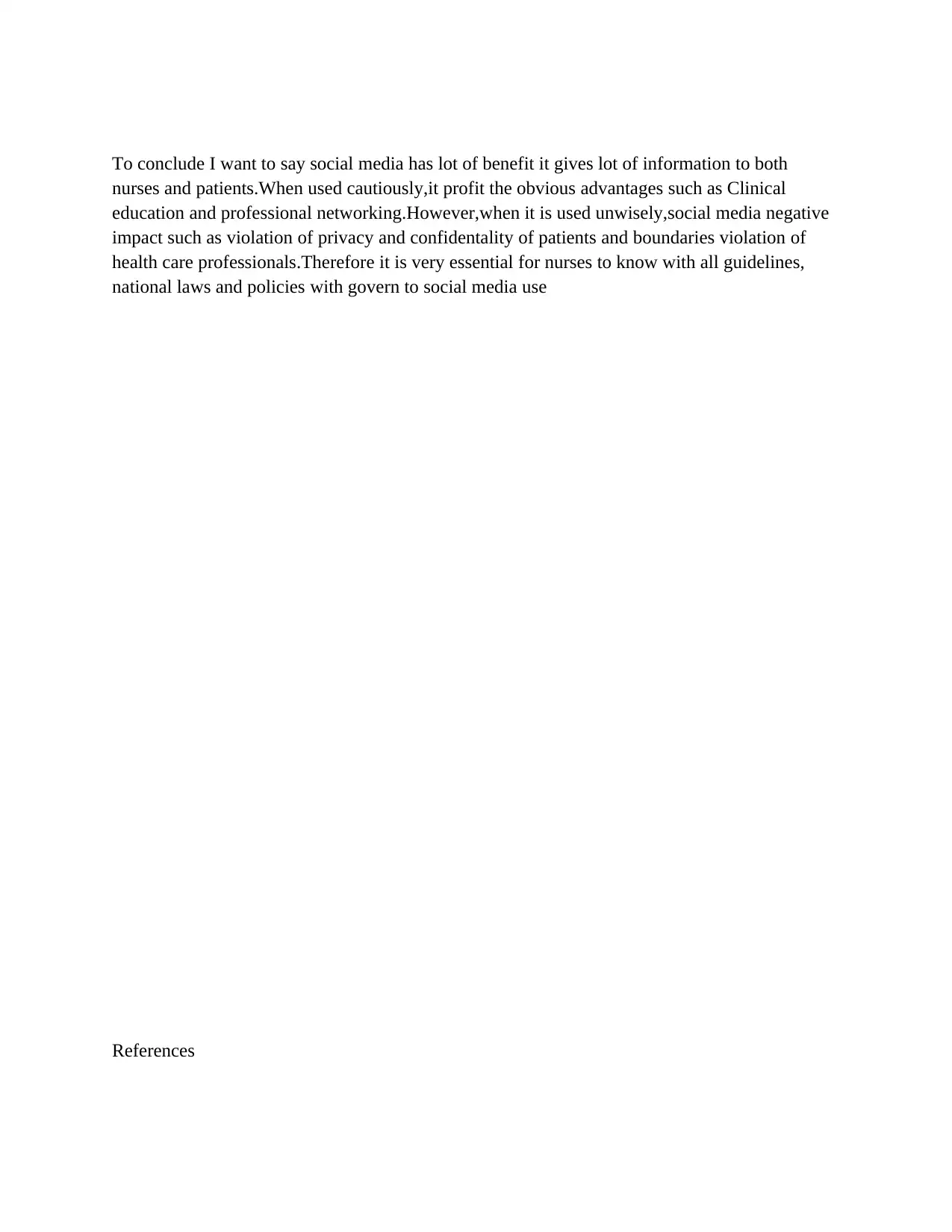
To conclude I want to say social media has lot of benefit it gives lot of information to both
nurses and patients.When used cautiously,it profit the obvious advantages such as Clinical
education and professional networking.However,when it is used unwisely,social media negative
impact such as violation of privacy and confidentality of patients and boundaries violation of
health care professionals.Therefore it is very essential for nurses to know with all guidelines,
national laws and policies with govern to social media use
References
nurses and patients.When used cautiously,it profit the obvious advantages such as Clinical
education and professional networking.However,when it is used unwisely,social media negative
impact such as violation of privacy and confidentality of patients and boundaries violation of
health care professionals.Therefore it is very essential for nurses to know with all guidelines,
national laws and policies with govern to social media use
References
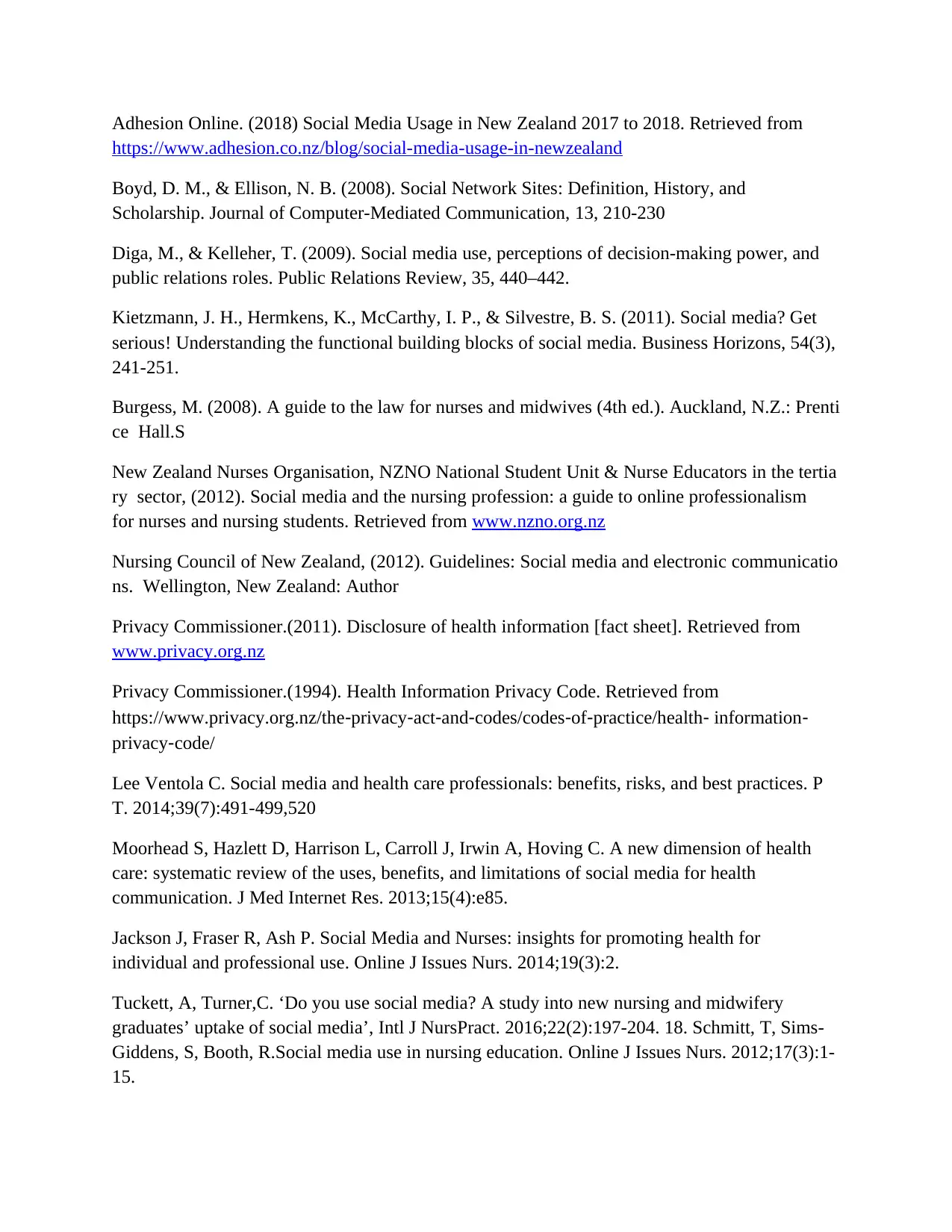
Adhesion Online. (2018) Social Media Usage in New Zealand 2017 to 2018. Retrieved from
https://www.adhesion.co.nz/blog/social-media-usage-in-newzealand
Boyd, D. M., & Ellison, N. B. (2008). Social Network Sites: Definition, History, and
Scholarship. Journal of Computer-Mediated Communication, 13, 210-230
Diga, M., & Kelleher, T. (2009). Social media use, perceptions of decision-making power, and
public relations roles. Public Relations Review, 35, 440–442.
Kietzmann, J. H., Hermkens, K., McCarthy, I. P., & Silvestre, B. S. (2011). Social media? Get
serious! Understanding the functional building blocks of social media. Business Horizons, 54(3),
241-251.
Burgess, M. (2008). A guide to the law for nurses and midwives (4th ed.). Auckland, N.Z.: Prenti
ce Hall.S
New Zealand Nurses Organisation, NZNO National Student Unit & Nurse Educators in the tertia
ry sector, (2012). Social media and the nursing profession: a guide to online professionalism
for nurses and nursing students. Retrieved from www.nzno.org.nz
Nursing Council of New Zealand, (2012). Guidelines: Social media and electronic communicatio
ns. Wellington, New Zealand: Author
Privacy Commissioner.(2011). Disclosure of health information [fact sheet]. Retrieved from
www.privacy.org.nz
Privacy Commissioner.(1994). Health Information Privacy Code. Retrieved from
https://www.privacy.org.nz/the‐privacy‐act‐and‐codes/codes‐of‐practice/health‐ information‐
privacy‐code/
Lee Ventola C. Social media and health care professionals: benefits, risks, and best practices. P
T. 2014;39(7):491-499,520
Moorhead S, Hazlett D, Harrison L, Carroll J, Irwin A, Hoving C. A new dimension of health
care: systematic review of the uses, benefits, and limitations of social media for health
communication. J Med Internet Res. 2013;15(4):e85.
Jackson J, Fraser R, Ash P. Social Media and Nurses: insights for promoting health for
individual and professional use. Online J Issues Nurs. 2014;19(3):2.
Tuckett, A, Turner,C. ‘Do you use social media? A study into new nursing and midwifery
graduates’ uptake of social media’, Intl J NursPract. 2016;22(2):197-204. 18. Schmitt, T, Sims-
Giddens, S, Booth, R.Social media use in nursing education. Online J Issues Nurs. 2012;17(3):1-
15.
https://www.adhesion.co.nz/blog/social-media-usage-in-newzealand
Boyd, D. M., & Ellison, N. B. (2008). Social Network Sites: Definition, History, and
Scholarship. Journal of Computer-Mediated Communication, 13, 210-230
Diga, M., & Kelleher, T. (2009). Social media use, perceptions of decision-making power, and
public relations roles. Public Relations Review, 35, 440–442.
Kietzmann, J. H., Hermkens, K., McCarthy, I. P., & Silvestre, B. S. (2011). Social media? Get
serious! Understanding the functional building blocks of social media. Business Horizons, 54(3),
241-251.
Burgess, M. (2008). A guide to the law for nurses and midwives (4th ed.). Auckland, N.Z.: Prenti
ce Hall.S
New Zealand Nurses Organisation, NZNO National Student Unit & Nurse Educators in the tertia
ry sector, (2012). Social media and the nursing profession: a guide to online professionalism
for nurses and nursing students. Retrieved from www.nzno.org.nz
Nursing Council of New Zealand, (2012). Guidelines: Social media and electronic communicatio
ns. Wellington, New Zealand: Author
Privacy Commissioner.(2011). Disclosure of health information [fact sheet]. Retrieved from
www.privacy.org.nz
Privacy Commissioner.(1994). Health Information Privacy Code. Retrieved from
https://www.privacy.org.nz/the‐privacy‐act‐and‐codes/codes‐of‐practice/health‐ information‐
privacy‐code/
Lee Ventola C. Social media and health care professionals: benefits, risks, and best practices. P
T. 2014;39(7):491-499,520
Moorhead S, Hazlett D, Harrison L, Carroll J, Irwin A, Hoving C. A new dimension of health
care: systematic review of the uses, benefits, and limitations of social media for health
communication. J Med Internet Res. 2013;15(4):e85.
Jackson J, Fraser R, Ash P. Social Media and Nurses: insights for promoting health for
individual and professional use. Online J Issues Nurs. 2014;19(3):2.
Tuckett, A, Turner,C. ‘Do you use social media? A study into new nursing and midwifery
graduates’ uptake of social media’, Intl J NursPract. 2016;22(2):197-204. 18. Schmitt, T, Sims-
Giddens, S, Booth, R.Social media use in nursing education. Online J Issues Nurs. 2012;17(3):1-
15.
⊘ This is a preview!⊘
Do you want full access?
Subscribe today to unlock all pages.

Trusted by 1+ million students worldwide
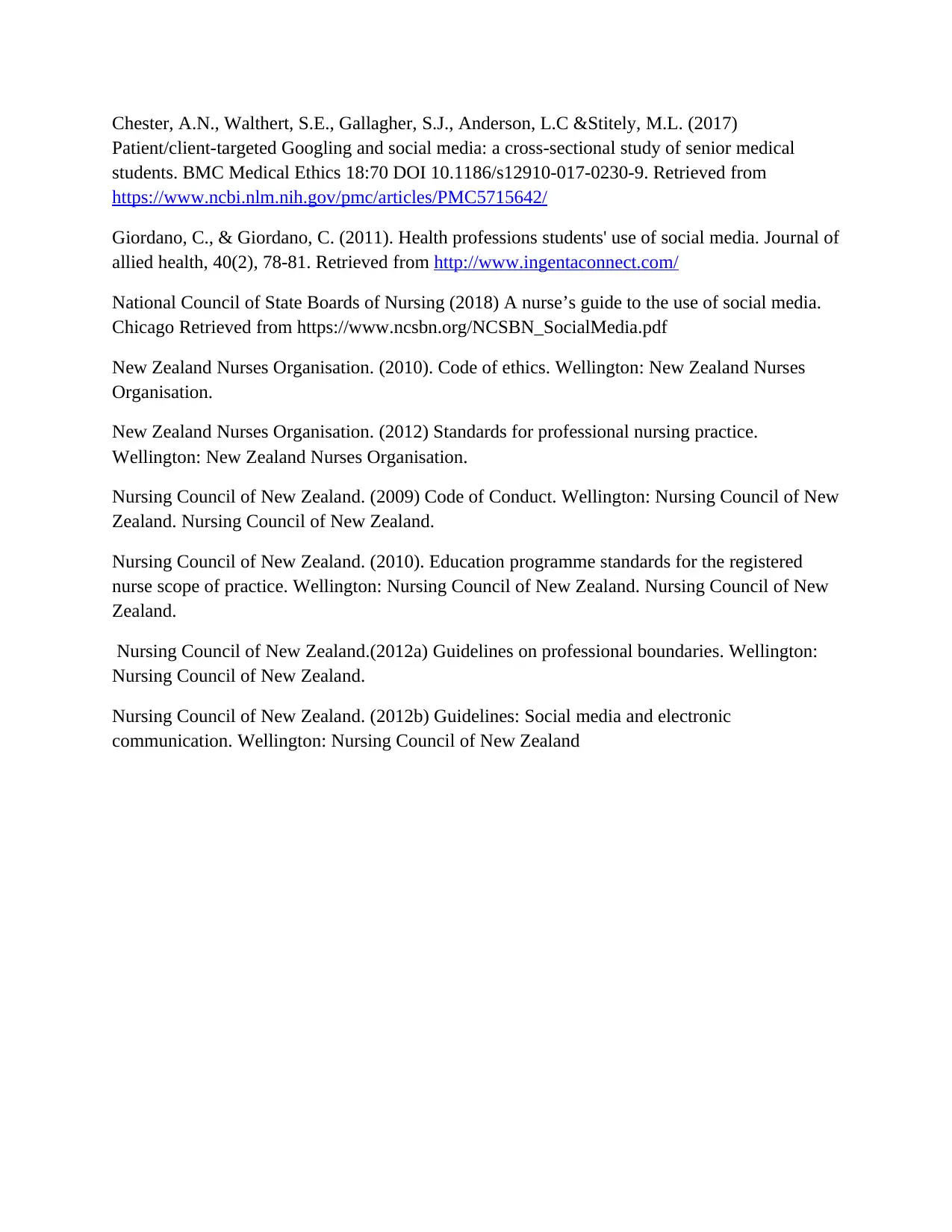
Chester, A.N., Walthert, S.E., Gallagher, S.J., Anderson, L.C &Stitely, M.L. (2017)
Patient/client-targeted Googling and social media: a cross-sectional study of senior medical
students. BMC Medical Ethics 18:70 DOI 10.1186/s12910-017-0230-9. Retrieved from
https://www.ncbi.nlm.nih.gov/pmc/articles/PMC5715642/
Giordano, C., & Giordano, C. (2011). Health professions students' use of social media. Journal of
allied health, 40(2), 78-81. Retrieved from http://www.ingentaconnect.com/
National Council of State Boards of Nursing (2018) A nurse’s guide to the use of social media.
Chicago Retrieved from https://www.ncsbn.org/NCSBN_SocialMedia.pdf
New Zealand Nurses Organisation. (2010). Code of ethics. Wellington: New Zealand Nurses
Organisation.
New Zealand Nurses Organisation. (2012) Standards for professional nursing practice.
Wellington: New Zealand Nurses Organisation.
Nursing Council of New Zealand. (2009) Code of Conduct. Wellington: Nursing Council of New
Zealand. Nursing Council of New Zealand.
Nursing Council of New Zealand. (2010). Education programme standards for the registered
nurse scope of practice. Wellington: Nursing Council of New Zealand. Nursing Council of New
Zealand.
Nursing Council of New Zealand.(2012a) Guidelines on professional boundaries. Wellington:
Nursing Council of New Zealand.
Nursing Council of New Zealand. (2012b) Guidelines: Social media and electronic
communication. Wellington: Nursing Council of New Zealand
Patient/client-targeted Googling and social media: a cross-sectional study of senior medical
students. BMC Medical Ethics 18:70 DOI 10.1186/s12910-017-0230-9. Retrieved from
https://www.ncbi.nlm.nih.gov/pmc/articles/PMC5715642/
Giordano, C., & Giordano, C. (2011). Health professions students' use of social media. Journal of
allied health, 40(2), 78-81. Retrieved from http://www.ingentaconnect.com/
National Council of State Boards of Nursing (2018) A nurse’s guide to the use of social media.
Chicago Retrieved from https://www.ncsbn.org/NCSBN_SocialMedia.pdf
New Zealand Nurses Organisation. (2010). Code of ethics. Wellington: New Zealand Nurses
Organisation.
New Zealand Nurses Organisation. (2012) Standards for professional nursing practice.
Wellington: New Zealand Nurses Organisation.
Nursing Council of New Zealand. (2009) Code of Conduct. Wellington: Nursing Council of New
Zealand. Nursing Council of New Zealand.
Nursing Council of New Zealand. (2010). Education programme standards for the registered
nurse scope of practice. Wellington: Nursing Council of New Zealand. Nursing Council of New
Zealand.
Nursing Council of New Zealand.(2012a) Guidelines on professional boundaries. Wellington:
Nursing Council of New Zealand.
Nursing Council of New Zealand. (2012b) Guidelines: Social media and electronic
communication. Wellington: Nursing Council of New Zealand
1 out of 7
Related Documents
Your All-in-One AI-Powered Toolkit for Academic Success.
+13062052269
info@desklib.com
Available 24*7 on WhatsApp / Email
![[object Object]](/_next/static/media/star-bottom.7253800d.svg)
Unlock your academic potential
Copyright © 2020–2026 A2Z Services. All Rights Reserved. Developed and managed by ZUCOL.





